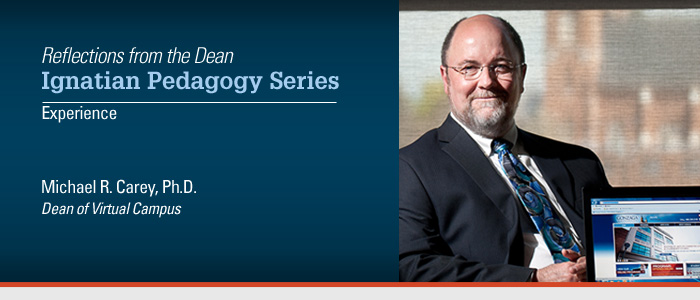Let’s continue our exploration of Ignatian Pedagogy, this time with a focus on the dynamic of Experience. My presentation is based on a document entitled “Ignatian Pedagogy: A Practical Approach,” which was written by the International Commission on the Apostolate of Jesuit Education in 1993.
As I mentioned previously, Ignatian Pedagogy begins with Context, so that we know as much as we can about the reality within which the learning takes place. From there, the learning itself proceeds with Experience.
We are accustomed to think of learning as being a cognitive experience, but Ignatian Pedagogy proposes that it is also an affective experience. In other words, the learner has feelings as well as thoughts about what is happening. This emphasis on both cognitive and affective experience in learning goes back to Ignatius of Loyola and his original method of facilitating transformation using the Spiritual Exercises. In directing Christian retreatants, Ignatius asked them to picture themselves in a Gospel story about Jesus. The retreatant not only understood the words Jesus spoke, but engaged in the full experience by imagining himself or herself as present in the scene with Jesus. Ignatius wanted both head and heart engaged in understanding who Jesus was and is for the retreatant.
In our modern educational context, the dynamic of Experience means that the learner needs to engage the subject—whether directly or vicariously—with both intellect and imagination. With adult learners, Experience also means re-experiencing things that have already happened in the life of the learner. This is where Ignatian imagination comes in handy, as it allows this re-experience to become visceral as well as intellectual.
Capturing the learner’s attention through powerful direct or vicarious experiences is just the starting point of being transformed. Experience must be followed by Reflection, Action, and Evaluation for authentic learning to take place. In future presentations I will share some background on these other dynamics of Ignatian Pedagogy.
Dr. Michael Carey
